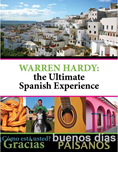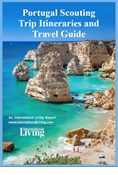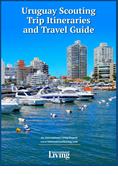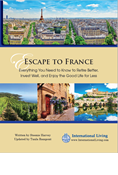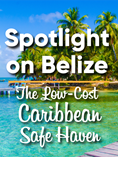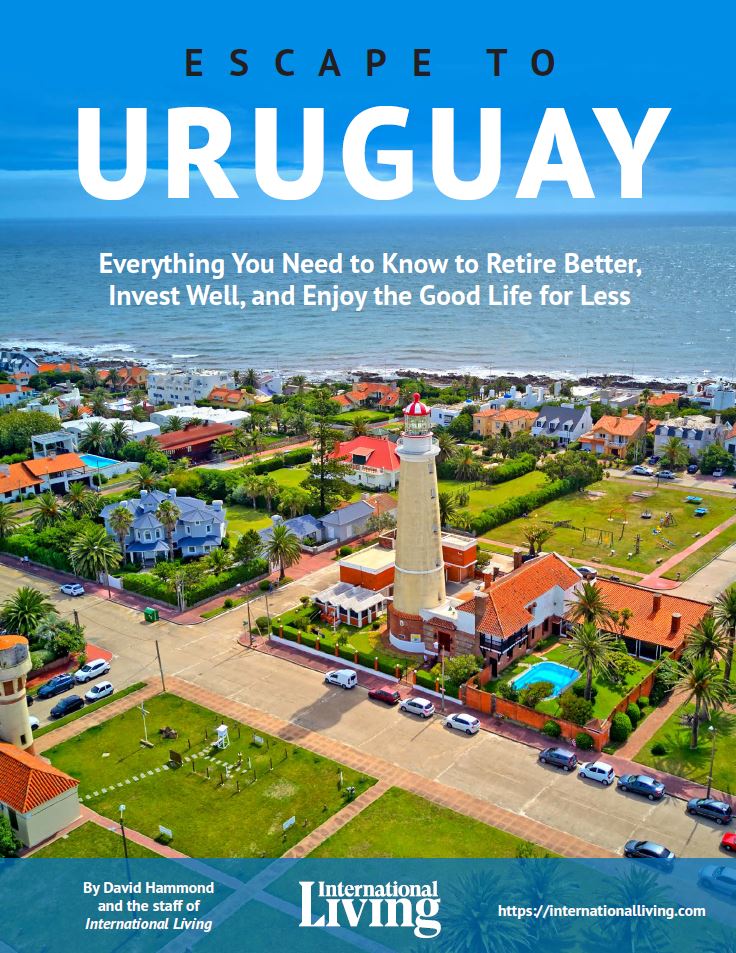
Escape to Uruguay
A Solid Democracy...Decidedly Middle Class...Safe, Tiny, Quirky Uruguay is Economically (and Politically) Sane...
Known for Gorgeous Beaches, Productive Farmland, and a Swift Path to a Second Passport...
The Pace of Life is Slow and the Cost of Living is Remarkably Affordable
Our special Escape to Uruguay: Everything You Need to Know To Retire Better, Invest Well, and Enjoy the Good Life for Less puts our Uruguay experts’ guidance in your hands.
If you're looking for a freer, better lifestyle, in Uruguay—one of the most modern and welcoming countries in the Americas—this is tailor-made for you.
You’ll get the latest intelligence about this good-value country’s best locales...from European-flavored Montevideo and the Costa de Oro to the glamorous beach resort of Punta del Este and well beyond...including up-and-coming destinations you’ll want to know about now.
Uruguay may be the safe haven you’re after...comfortable, affordable, easy to obtain residency and even a second passport...and no sacrifices whatsoever. Now’s the time to discover all that the “Switzerland of South America” has to offer you.
Uruguay is “a culture comfortable in its own skin...where newcomers are treated with trust and respect,” says expat Joy Kopp who retired there from Minnesota three years ago with her husband Jim Reinken.
It’s a decision these 69-year-olds don’t think they’ll ever regret. Although Uruguay, tucked between the big egos of Argentina and Brazil, is a humble Missouri-sized country (but with half the population), it’s big on value.
Originally settled by immigrants mostly from Europe, Uruguay takes its cues from its history and feels more European than Latin, even so far as its distinctly Mediterranean climate.
As Joy and Jim will tell you, there are few sacrifices here. You’ll find excellent highways and abundantly reliable public transportation, a well-developed communications infrastructure, modern well-stocked supermarkets, excellent and affordable healthcare, and everywhere fresh, high-quality food.
Despite its small size, farmland in Uruguay is so productive and farming practices so efficient that Uruguay easily yields enough food to feed its population many times over.
But “maybe it’s not so much what’s here, but what’s NOT here,” says Joy. “No clogged freeways, no polluted air, no living at breakneck speed. But even more visible is a distinct lack of anger, hostility, and belligerence.
“There is a refreshing sense of cohesion, of acceptance, of happiness.” Life in Uruguay is just, well, “tranquil,” she says.
She and Jim especially appreciate that they no longer worry about having access to affordable-yet-excellent healthcare. Before they even decided where they would live, having medical coverage in place was their first priority.
After doing some comparative shopping, they enrolled in a local health plan that costs them each just $55 a month.
Fortunately, living in Uruguay sees them healthier than ever. A diabetic with asthma, Jim has never needed his inhaler and his diabetes requires half the insulin, giving him twice the control of his sugar that he had in the U.S. Meanwhile, Joy dropped two dress sizes, thanks to walking more and because “the food is healthier without all the processing.”
To top it all off, their cost of living has dropped a few sizes, too.
Even though they live in the glamorous seaside resort of Punta del Este...where billionaires and supermodels own vacation homes...they spend less than $1,000 a month, and $450 of that is their common expenses (security, sewer, water, maintenance, etc.) for the building where they own a two-bedroom apartment.
It’s a “modest” apartment, Joy says, with views of the Atlantic Ocean just two blocks way. They bought it fully furnished for just $200,000.
(Just to give you some perspective, prior to buying, Joy and Jim paid $1,000 a month to rent a fully furnished two-bedroom apartment, also with an ocean view and just across the street from where they now own..)
I’m Jackie Flynn, publisher of International Living. And I’d like to share more about Uruguay.
Let me get this out of the way: It’s not the lowest-cost destination we cover. But as Jim and Joy will tell you, it’s possible to live a very comfortable life on a low budget in Uruguay—and that’s without sacrificing.
Jim and Joy do that, in fact, on Jim’s Social Security benefits, which pretty much covers all their expenses, they say.
They don’t have a car, because they don’t need one. Just about everything they need is close at hand. And besides, walking keeps them healthy. Public transportation, when they need it, is “cheap and reliable.”
They rent a car if they need to. As Joy says, “We live simply. We don’t buy things we don’t need, even though we can afford them. Our ancestors called this living below your means.”
She likes to cook, and says “We spend about $200 a month on groceries, wine, beer, etc. For about $100 a month we eat out a few times a week, either alone or with friends.”
Now...if you’ve done any research at all, you might be wondering if everything you read about Uruguay is true. Is it as modern and well-developed as it’s made out to be? Is it welcoming to foreigners, especially those who want to relocate there? Can it possibly live up to being called the "Switzerland of South America" as it was dubbed way back in 1951 when Uruguay first became known for its safety and political neutrality, and as a banking and tax haven?
Turns out the answer to all those questions is "Yes." In fact, Uruguay has far more going for it than most any other country else these days.
Uruguay Has it All: Beautiful Beaches. Fertile Farmland. European-Flavored Cities. A Smart, Stable Government and a Growing Economy. Low Taxes. Banking Privacy. Affordability. And More…
Talk to anyone who’s been to Uruguay and they’ll tell you it’s the most progressive and advanced country in South America, with clean city streets, safe highways, a modern, reliable public transportation system, in fact, all-around terrific infrastructure and technology.
Uruguayans are mostly of European descent, principally Italian and Spanish. Other immigrant groups include Portuguese, Armenians, Basque, Germans, and Irish, making the country somewhat of an ethnic melting pot, much like the U.S.
Best of all, Uruguayans are known for being genuinely warm, helpful and friendly. They’re highly educated, too—the literacy rate is an outstanding 98.6%. You’ll find far less noticeable poverty here than elsewhere in the western hemisphere, even including the U.S.
This is all to say that Uruguay is highly democratic and free. It’s decidedly middle class and wealthy. It’s a place where you’ll instantly feel comfortable and welcomed.
In Uruguay, you won’t give up the quality you’re used to…or worry about anything, really.
For instance, you needn’t worry about the quality of healthcare (excellent) or how much it costs. (Keep reading to learn more about Uruguay’s top-quality healthcare infrastructure.)
You needn’t worry about sky-high taxes or the safety of your bank account…or lots of violent crime…
And don’t worry about volcanoes, hurricanes, earthquakes, or snowstorms in Uruguay, these are non-existent.
You can have all the First World comforts without paying for them…and without accepting any of the trade-offs that normally come with living in a developing country.
Uruguay is the best of Latin America without any compromises.
Best of all, as Joy Kopp says, you needn’t worry about the welcome you’ll receive in Uruguay. Uruguayans are among the warmest, most content (and best-educated) people in the world. The government actually encourages newcomers to make a new, better life in their country.
One reason the government is so welcoming is because of those ancestral ties to Europe. This culture is prevalent in sidewalk cafes, classical music, wonderful European cuisine accompanied by great wines, and the Uruguayans’ genteel approach to living. They enjoy living well, and so can you…
How to Find Out if Uruguay is Really Right For You…
It’s almost impossible to get good, up-to-date information about Uruguay. Only a few travel guidebooks in English that cover Uruguay. And the internet is loaded with unreliable or dated information about living there.
Believe me, I know. International Living has spent hundreds of hours doing research on Uruguay…not to mention the time and money we’ve spent traveling there over the last four decades.
And now we’re ready to introduce you to the Uruguay only insiders know…
It’s all in our Uruguay resource called: Escape to Uruguay: Everything You Need to Know to Retire Better, Invest Well, and Enjoy the Good Life for Less.
In a moment, I’ll explain everything else that’s included in this packed resource. But first I want to introduce you to David Hammond, the chief architect of Escape to Uruguay and our full-time Uruguay correspondent.
There’s no one better suited to this job—and to keeping his finger of the pulse of everything happening in exciting Uruguay—than David. A longtime resident of Port Townsend, Washington, he spent 10 years there as a licensed Merchant Marine captain operating his own charter boat.
In 2006, he decided to check out Uruguay. And he liked it so much he moved there later that year. Soon thereafter, he started writing about his experiences and the benefits (and yes, the challenges, too) of expat life in Uruguay.
A few months ago, I asked David to take on the task of updating our comprehensive Escape to Uruguay manual. We’ve been publishing it for more than a dozen years now and we update it often. But this time around, I asked David to do something different...
I asked him to bring his years of experience to the table and not just update facts and figures, but to offer his objective, non-censored viewpoint on every aspect...from the towns and cities he profiles to the true quality of the lifestyle and especially the healthcare system.
I asked him to share his hard-won tips and advice...the kind of guidance you’d want and need if you were planning a move to a new country.
What David has done is extraordinary. He not only brings his expertise and judgment to bear but he gives you an unparalleled insider look at Uruguay that you can’t find anywhere else. And the insider tips he’s sprinkled throughout (such as the most important question to ask a real estate agent before enlisting them to help you find a rental apartment) will save you lots of money and headaches.
If you’re seriously considering Uruguay for your home, Escape to Uruguay hands you everything you need to know. There’s no better way—perhaps no other way at all—to know for certain if Uruguay is right for you.
For example, when most people think of Uruguay, the country’s beach scene comes to mind. Particularly the glittering beach resort of Punta del Este. Or perhaps you think of the European-style city of Montevideo…or the cattle ranches…or maybe even the great vineyards and wineries.
And certainly any one of these things is worth coming to Uruguay for.
But what really sets Uruguay apart is what’s behind the scenes. And that’s what David delivers. He introduces you to “his Uruguay” and explains why he believes it’s the place to be in the coming decade.
Much of it has to do with Uruguay’s status as a truly well-developed country, with all the attributes that go along with that. I’ve already mentioned some of these, but they’re so important to your quality of life they’re worth repeating:
- Security. Uruguay is safe. Violent crime happens everywhere, but it’s rare in Uruguay, especially outside Montevideo. Even petty crime is not much of a concern in most areas. Uruguay, along with Chile and Costa Rica, consistently ranks as one of the safest of all 20 countries in Latin America.) That’s because along with having one of the highest standards of living, Uruguay has one of the lowest poverty levels in Latin America. In fact, according to the Global Peace Index released every year by the esteemed Vision of Humanity Organization, as of 2020 Uruguay is the third most peaceful country in the Americas, ranking only behind Canada and Costa Rica…and far ahead of the U.S.
- The government is stable, the economy and banking system is solid. Uruguay’s stable government and banking system bring offshore investors from the world over. All banks are controlled by the Central Bank of Uruguay, which has a strict policy regarding the authorization of new banks. By the way, while 465 banks failed during the global crisis between 2008 and 2012 in the U.S., Uruguay continued chugging along with barely a hitch. It was, in fact, the only country in the Americas to not experience a recession between 2007 and 2009.
- Modern, reliable infrastructure—from safe highways to super-fast internet. Uruguay’s highway system is modern, well-kept and well-marked. You can travel rapidly and safely around the country. Water runs clean and pure from every tap. The electricity system is reliable, and phone lines are plentiful, inexpensive, and dependable. High-speed internet access is available and inexpensive throughout the country, offering everything from ADSL to dedicated fiber-optic lines. And yes, you can get English-language satellite TV so you don’t miss a single one of your favorite programs or sporting events.
- There are no restrictions on foreign property ownership. You don’t even need to be a resident to purchase or own property. And there are no special fees, taxes, permissions, or registrations required because you are a foreigner. You have the same rights as Uruguayans when it comes to property ownership. And there are no restrictions on where you can buy a property. Unlike many other countries, foreigners can buy beachfront land, land adjacent to international borders, and agricultural land in any quantity.
- The streamlined residence process can be started immediately. With the proper documents, you can start the process as soon as you walk off the plane. And new residents are entitled to bring their entire household along, duty-free…and you can do that even if you have not yet received your visa...as long as you have started the residence process.
- You can enjoy the freedom and protection of dual citizenship and a second passport. Uruguayan law allows for multiple-country citizenship. So you can obtain your Uruguayan passport while keeping citizenship in your home country.
- Reduce your tax burden substantially. You won’t pay tax on income from outside Uruguay, including rental income, capital gains, a retirement pension, and social security payments. You’re liable, though, for a small amount on income and dividend interest—but only after living in Uruguay for more than five years. The good news, though, is that if you pay taxes on that in your home country, you are excluded from paying it in Uruguay. Property taxes are low, ranging from 0.2 percent to 0.4 percent of the property’s value, and can vary from area to area and from property to property. For a home valued at $150,000, therefore, you could expect to pay tax of approximately $300-$450.
All this and more is covered in the bigger and better-than-ever 250-page Escape to Uruguay manual.
You’ll get a full rundown on the country’s history and current political and economic status, on residence and citizenship procedures, all the details on taxes, including those cities, towns and regions with low tax assessments, and much, much more, especially including one issue where Uruguay really shines. And that’s this:
Uruguay Offers Top-Quality Healthcare and Some of the Most Affordable Health Plans in the World
As a resident of Uruguay, you’ll be eligible for healthcare benefits that are among the world’s best. In fact, say expats, the cost of a health plan is among the most pleasant surprises they’ve had when moving to Uruguay.
Canadians Syd and Gundy Blackwell, for instance, came to Uruguay in 2006 specifically looking for healthcare solutions. Gundy needed hip replacement surgery and Syd needed hernia surgery, but the wait times in Canada for either procedure were just far too long. Same in the U.S. and costs there were far too high.
After a two-week exploratory trip, they moved to Uruguay's pretty Costa de Oro, near the town of Atlántida. Once they obtained their residence visas, they separately qualified for health insurance through a local mutualista (a hospital-based program) and after satisfying the six-month waiting period, they both had their needed surgeries.
Today, at ages 74 and 70, Syd says, they pay just 1,945 pesos—about $46 a month USD per person for a comprehensive mutualista healthcare plan through their local Española Hospital.
Joy and Jim—the couple I mentioned earlier living in Punta del Este—pays less than $110 a month for the two of them for their health plan…and Jim came to Uruguay with existing medical conditions.
In case they might need it, they also bought an emergency ambulance plan to transport them to a state-of-the-art hospital in Montevideo, a bit more than an hour away. This costs $300 a year for the two of them. And because they paid the full year in advance, “we got two months free,” Joy says.
For your convenience (and your pocketbook) there are a variety of plans to choose from. You can, of course, obtain private health insurance plans from a company like Blue Cross. By far, though, mutualistas are the most popular option for expats, typically costing between $50 and $100 per month for someone of retirement age. Other options include premium-service hospital plans that comes with shorter waits and more personalized attention, which can cost from $250 to $350 per month. Yet another choice is the public healthcare system, with hospitals and clinics spread across the country at a cost of around $50 per month.
Expats we've interviewed have had nothing but praise for the Uruguayan healthcare system. Most all of them are over 60 and had pre-existing conditions—diabetes, heart problems, a prior bout with cancer—yet all were able to obtain a healthcare plan in Uruguay and have been delighted with the care they've received.
Your Escape to Uruguay manual contains a comprehensive chapter on healthcare and provides more details on costs and options, even including assisted living options. Contact information is provided so you’ll know exactly who to contact to sign up or for more information.
Escape to Uruguay Introduces You to a First World Country With a Variety of Lifestyles…and for All Budgets
No matter how much money you have to spend—or what kind of lifestyle you are looking for—Uruguay has something to offer.
From small beach towns to Latin America's premier seaside resort…from the aptly named 17th century colonial city of Colonia to Montevideo's art deco Old Town…from small gentleman farms and boutique vineyards to huge estancias sprawling throughout the interior…Uruguay is sure to have a lifestyle that appeals to you.
Of course, when most people think of Uruguay, they think "beaches," and rightly so.
Starting in downtown Montevideo, in fact—the nation's capital city, known for its European-style city life and cultural ambiance—you'll find wide sandy beaches perfect for sunning and swimming, and ramblas (boardwalks) that are clean, well-kept, and bustling with activity all year.
Go just a bit farther along the coast and you'll find small, sweetly pleasant beach towns that are an easy "public transit" commute to both Montevideo and the international airport…old fashioned resorts that will remind you of so many American seashore towns of the 1950s…and one coastal section in particular that’s been left back in time, harboring some of Uruguay’s best property buys.
But the crown jewel of the coast, of course, is Punta del Este, the most famous of Uruguay’s resorts, and in fact, the leading beach resort in South America. Its brilliant beaches and sparkling waters draw visitors from the world over, as Punta del Este’s tiny full-time population most of the year swells to over a half-million in the summer with people who come to enjoy Uruguay’s highest concentration of fine dining, shows, casinos, cafés, and boutiques.
But there’s so much more to Punta del Este and coastal Uruguay…
Within two miles of Punta del Este’s busy downtown—literally just a few minutes away on the public shuttle—you’ll discover quiet, residential neighborhoods and uncrowded beaches hidden behind the dunes. Living here will make you feel like you’ve got the best of both worlds: a relaxed, peaceful setting, but with all the resort-style amenities nearby.
Beyond Punta del Este, you’ll find Uruguay’s most pristine beach settings. Long stretches of deserted white-sand beaches bordering deep-blue Atlantic waters and old fishing villages that have now developed their own vacation-home trade and property market.
Stretching all the way from Montevideo to Brazil, you’ll find a magnificent coastal diversity—something for everyone and something for every budget.
You Can Still Buy a Beach Home in Uruguay for As Little As $100,000.
Just look at some of these property prices—not the lowest prices, but typical of what you’ll find in Uruguay:
In the bustling seaside resort of Atlántida, a 624-square-foot two-bedroom one-bathroom apartment, built in 2015, is less than two blocks from the beach. It has gorgeous laminate flooring, granite countertop in the kitchen, a sliding door to the balcony, and includes a covered parking place. The price is just $123,000.
Even in glittering Punta del Este you’ll find bargains. Less than a block from the beach at Playa Mansa, is a two-bedroom/two-bath apartment with a garage space. There’s a balcony with a view of the garden and a community pool. Playa Mansa is one of the city’s most popular areas, thanks to its safe, tranquil swimming beach. The asking price is just $125,000.
If you’d prefer something larger, you’ll find a 1,700-sq.-ft. five-bedroom home with a red tile roof in popular Pinares, just a few blocks from the sea. On a lushly landscaped 7,000-sq.-ft. lot, it’s been stunningly remodeled with a fully modern kitchen and gorgeous wood and tile floors throughout. It’s priced at a low $270,000.
In the pretty seaside town of La Paloma, there's an attractive two-bedroom/two-bath house on a 5,112-square-foot lot just 250 meters from Aguada Beach. This home, built in 1997, has beige tile flooring and wood window frames. On the ground level is the main living area with a kitchenette and dining space. Upstairs are two bedrooms. And the price is right at just $100,000.
In the small, laidback beach town of Piriapolis, a lovely two-bedroom modern-style home has an expansive view of the ocean. It has a wood-burning stove, a large lawn with trees, air conditioning, and, of course, a built-in outdoor barbecue. Bargain priced at: $140,000.
By the way, we’ve uncovered rental properties in all these areas and more…nice, three-bedroom homes you can rent near the beach for as little as $800 a month.
In your Escape to Uruguay manual, you’ll discover where to find the best property prices and much more. We explain where to go and provide contact information so you can reach out for more details.
Explore the Capital City of Montevideo:
An Old-World City With European Flavor…But Without the Price Tag
In Montevideo’s Ciudad Vieja (Old Town), Uruguay’s magnificently restored national theater, Teatro Solís, is an architectural ornament from a bygone era, but where it’s typical to see today’s best world-famous performers…opera, ballet, theater, contemporary music, and more.
And just a half block down the street, you can pop into a tiny tango club that looks more like an abandoned building by the light of day. The singing and dancing here will go on well after Teatro Solís has closed for the night.
Not interested in the club scene? No worries. You’ll find couples dancing the tango in neighborhood plazas any night of the week. Just find a park bench or a table at a nearby sidewalk café, order a carafe of wine, and enjoy.
You’ll also find some of the city’s best fine-dining establishments in Ciudad Vieja. If you’re a meat lover, you’ll never want to leave. As you may know, Uruguayans love their beef—you’ll find open-air barbecue restaurants, called parilladas, on every corner.
But thanks to that bountiful ocean offshore, seafood of every delicious variety is plentiful, too, as is handmade pizza, sorrentinos, raviolis, gnocchi…you name it. (Again, the European influence is strong.) And as for cooking at home, the supermarkets and specialty food stores are as good as you’ll find in New York, Paris, or Rome.
This is life in the big city…a world capital. I’d hazard to say that if you like cities, Montevideo—which consistently ranks as one of the most livable cities in South America—will cast its spell over you.
In recent years, a firestorm of activity has been brewing in Montevideo’s original historic center, where colonial restorations are the name of the game. People have come from all over the world to renovate boutique hotels and high-end office suites, or to find a second home in a great city…the perfect place to hide from the North American winters.
But there’s another neighborhood in Montevideo that deserves your attention, too. It’s where many expats choose to live.
"It reminds me of the Riviera or Italy or elsewhere in Europe," says one. "It’s completely self-contained with little shops and restaurants and its own nightlife. There are shady little parks and we’re right next to the water. You can walk everywhere, you don’t need a car."
You’ll get all the details about this and all of Montevideo’s trendiest, prettiest, and safest neighborhoods in the new edition of Escape to Uruguay.
Here’s a Sample of the Types of Properties
You’ll Find in Montevideo:
- A bright, brand-new one-bedroom apartment with floor-to-ceiling windows, is conveniently located in the downtown Ciudad Vieja region. Steps from the rambla, it's on the market for just $121,000.
- Located in a bustling part of Centro, a newly renovated apartment has sliding doors that open to a huge balcony where you have a view of the sea and the city.The price is just $96,000.
- In the upmarket area of Pocitos, a totally modern second-floor one-bedroom apartment with a large and lovely terrace is just a short walk from Pocitos Beach. Price: $120,000.
- And in the trendy, upscale neighborhood of Carrasco, a brand-new two-bedroom apartment has high-quality wood laminate flooring in the living area and bedrooms, and tile flooring and sleek fixtures in the kitchen and two bathrooms. The main balcony has a built in brick barbecue. The apartment comes with a garage space included in the price of $325,000.
A note about property prices: Montevideo is a world-class city, with all kind of properties and accompanying price ranges. The properties listed here are those that our writers would personally consider living in…good properties at low prices. They’re not the least expensive properties available but will give you a good starting reference.
Remember, in your copy of Escape to Uruguay you’ll get our complete rolodex with all the contacts you need to help in your search for the perfect property for you.
And if you’re interested in a long-term rental in the Montevideo area, you’ll be happy to know there’s no shortage of apartments for rent, and prices are reasonable. In Escape to Uruguay we’ll tell you exactly what you should pay and how to find and negotiate the best rental properties.
We’ll Also Help You Venture Away From
the City and Shoreline…
to Find Great Opportunities and an Even Lower
Cost of Living
In Escape to Uruguay you’ll get to know more about places that most guidebooks don’t even cover. Places like:
- Colonia de Sacramento—one of the world’s most faithfully restored Portuguese colonial cities, and a longtime favorite with Argentines, but where North Americans are moving in now, too. You’ll love strolling the romantic cobblestone streets and alleyways with the moonlight sparkling off the water. (The Rio de la Plata is wide and clean here and flanked by gorgeous sandy beaches, perfect for swimming.)
- Mercedes, a small, friendly city on the banks of the wide Río Negro, where you’ll find a sheltered marina, a lush city park, and safe streets…where bicycles sit unattended and children play safely in the square. If you’re looking for a low cost of living, check out Mercedes—it will remind you of the small and safe towns of the U.S. Midwest.
- You’ll learn about the town at the heart of Uruguay’s ranching region, surrounded by huge tracts of rolling ranchland, eucalyptus forests, and farms…a town with the hardworking, wholesome feel of the American Midwest. Farming and ranching can be quite profitable in Uruguay, and if that’s your interest, you’ll find out exactly how to go about it.
- And you’ll also discover the unique culture and fantastic lifestyle found along the Uruguay River, in cities like Paysandú, Salto, and Carmelo…places you’d never find in a guidebook.
Escape to Uruguay will introduce you to the Uruguayan Interior like no other source available. I can guarantee you won't find this information in any book, and especially not on the internet.
We’ve spent decades researching Uruguay…and make no mistake, this isn’t a travel guide—although we do include details of our favorite hotels and restaurants and offer travel pointers and must-see sites for all the popular destinations we introduce you to.
Our editors, correspondents, and contributors live in Uruguay or they’ve spent extensive amounts of time there. They’ve experienced all the benefits this country has to offer and interviewed hundreds of expats who’ve done the same. They’ve been through the challenges, too—and they tell you all about these—there’s no sugar-coating here.
For instance, as David Hammond writes, “Uruguay is not the place to settle if you want a large, well-organized North American expat community, or if you intend to speak only English. There are other countries that are better suited to this lifestyle.
“The North Americans who do make it down here often give the same reasons for coming. Overwhelmingly, they choose Uruguay for its political, social, and economic stability, as well as the fact it has the best infrastructure, and is among the safest countries in Latin America.”
With Escape to Uruguay, you’ll benefit immediately:
- SAVE TIME! Whether you’re a city, country, riverfront, inland, or beach person, there’s a perfect place in Uruguay for you…probably more than one. But no worries, you’ll get the pros and cons to help you narrow down the choices and save hours of painstaking research and expensive travel time. We’ll help you pick the best locales in the country that best fit your lifestyle.
- SAVE MONEY! We’ve done the scouting work for you and provide you with the names, phone numbers, and email addresses for our most trusted and helpful contacts. This information is worth its weight in gold (and can save you hundreds of thousands of dollars).
- MAKE MONEY! A full chapter of the is devoted to Doing Business in Uruguay. We explain all the details…requirements, obligations, etc. that pertain to foreigners, and we tell you where and how to get started. And of course, we provide complete references and resources to help you launch your new business. If you’re thinking of ranching, farming, starting a resort business, or operating a hotel, restaurant, or B&B, this detailed information is exactly what you need…
Escape to Uruguay Provides Up-to-the-Minute Information That You Simply Will Not Find
Anywhere Else
- You’ll save thousands of dollars and months of time with detailed pointers to help streamline your path to legal residence. This information alone can be worth more than 10 times the cost of the manual itself. You’ll save money on immigration consultants, lawyers, and some inevitable mistakes. There is absolutely no better, more accurate source for this information.
- You’ll stay ahead of customs requirements by understanding the rules for importation of your household effects. There are many choices to be made, and many options to consider. And most moving companies aren’t familiar with all of them.
- You can maintain control of your real estate transactions with the guide to buying property in Uruguay. Don’t be caught with others telling you—especially in internet forums—what your rights and responsibilities are. Knowing the reality of how it works keeps you in the driver’s seat.
- And you can stay ahead of the tax man by understanding the latest changes to Uruguay’s tax law. This is critical, and always in flux. Some of what you’ll find on the internet can be dangerously outdated. Discover which taxes, if any, apply to you right now.
By the way, Escape to Uruguay's comprehensive guide to business and taxes was prepared with the cooperation of one of Uruguay’s top tax attorneys and it’s up-to-the-minute with the new changes in the tax law for individuals and corporations.
As I’ve said, Escape to Uruguay has just been completely updated. David Hammond and our team of editors have gone through it page by page and sentence by sentence to ensure that all the information…all the resources and contact details, including websites, email addresses and telephone numbers…all the maps, statistics, dollar figures and prices quoted…are completely up-to-date.
We’ve left no stone unturned, no page untouched. And the best part is that we publish this manual electronically so it's much more useful, colorful, and interactive than ever before.
Hit "Add to Cart" to avail of this offer!
Escape to Uruguay is Not Available Anywhere Else
You won’t find any of these valuable resources in bookstores, resource libraries, or anywhere else on the internet. They’re available in an online downloadable form only. That's how we can keep the information as up-to-date and reliable as possible. It also allows us to get this information in your hands as quickly as possible.
As Always, You Can Try Escape to Uruguay Completely Risk-Free

As always, Escape to Uruguay comes with our ironclad International Living 30-day money-back guarantee.
If it does not meet your expectations—for any reason at all—just let us know within 30 days.
And a no-question money-back guarantee if you're not 100% satisfied.
That's a serious bargain for the amount of current, usable information you’re about to receive—especially considering that it could launch you on your way to the most enjoyable, top-quality and affordable life you've ever imagined.
Sincerely,

Jackie Flynn
Publisher, International Living





